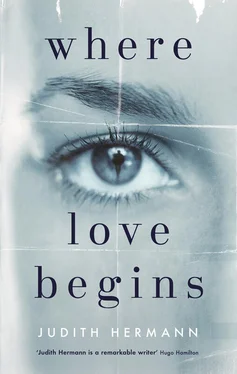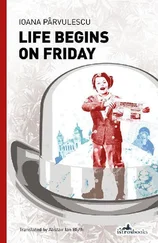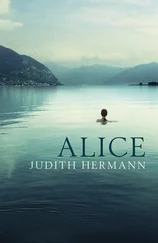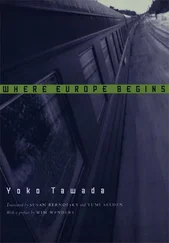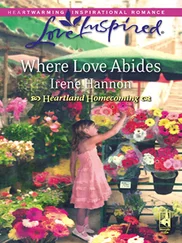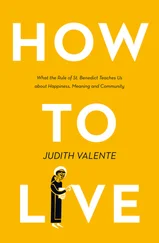Judith Hermann
Where Love Begins
JUDITH HERMANNwas born in Berlin in 1970. She is the author of Alice, The Summer House, Later and Nothing but Ghosts, which have received a number of literary awards including the Kleist Prize. She lives and works in Berlin.
It’s like this — Stella and Jason meet on an airplane. A propeller plane, not a long flight. Stella was coming from Clara’s wedding. She caught the bridal bouquet, that’s probably why she’s so distraught; and she had to say goodbye to Clara, that’s why she’s feeling so forlorn. It was a beautiful wedding. From now on Stella is on her own. Jason was coming from a construction site. He was laying tiles, that’s why he’s so dusty. And he worked all night long, driving to the airport at the crack of dawn; that’s why he’s so tired. The job is finished; he’ll be looking for a new job. Fate, or whoever, has seated Stella next to Jason, row 7, seats A and C. Stella will save the boarding pass for many years. For many years. Jason is sitting by the window; the seat next to him is empty. Stella’s seat is on the aisle, but in spite of that she sits down next to Jason. She can’t help it.
Jason is tall and lean, unshaven; his black hair is grey because of the dust. He’s wearing a rough woollen jacket and dirty jeans. He looks at Stella as if she’d taken leave of her senses, looks at her angrily; she startles him. So direct, so unceremonious. Nothing that could have been dragged out. If Stella hadn’t caught Clara’s bridal bouquet — jasmine and lilacs, a luxuriant abundance tied with a silken ribbon — she wouldn’t be so breathless. Glowing cheeks, a shocking lack of detachment.
Stella, my name is Stella.
She says, I’m afraid of flying. I don’t do well flying. May I sit next to you; please, could I just stay here sitting next to you.
It’s the truth. Jason’s expression changes; it doesn’t exactly soften, but it changes. He says, You needn’t be afraid of flying. Please sit. My name is Jason. Sit down, stay.
*
The plane rolls down the runway, gathers speed, takes off and flies. It flies up into the pale, distant sky, breaking through the clouds. The earth below them, an earlier life, are left behind. Jason’s hands are dirty and stained with paint. Turning the right one palm up, he holds it out to Stella. Stella puts her left hand in it; his hand is rough and warm. He pulls her hand towards him and puts it in his lap, closes his eyes. Then he falls asleep. Later this will be like an omen. Stella could have figured it out back then — she is afraid, and Jason sleeps. Sleeps even though she is afraid. But he would say he slept so she could see that being afraid was absurd. Back then she didn’t understand this.
*
As the plane lands, he opens his eyes and smiles. Such very dark eyes, almost black, with a faraway look. But he is smiling. He says, See, Stella, you made it. He now takes her hand into both of his, and then he kisses her hand, the back of her hand, hard and sure.
Will we see each other again, Stella says. Shall we see each other again.
Yes, Jason says, he says it without thinking it over — Yes.
Stella writes her phone number on his boarding pass. Then she gets up and flees. She climbs out of the plane, down the metal stairs, back to earth without looking back even once.
It is cool, raining. Impossible to know how it will go on from there.
Jason phones three weeks later. Stella never asks him what he did during those three weeks, what he was thinking about for so long; what conclusion he finally arrived at.
The house is in a development in the suburbs. It’s a simple house, two floors and a mossy, tiled roof, a picture window next to the front door, and a sunroom out the back. The lot isn’t a big one. A jasmine hedge secludes it from the street. A tarpaulin has been stretched over the sandpit, and three chairs have already been set up around a garden table standing under a plum tree still bare of leaves. Fragile, yellow flowers in the short grass, maybe winter aconite. At the edge of the garden begins a rank meadow, a fallow field. It’s been like that for who knows how long. At some point they’ll build new houses there. But so far the garden just runs into the meadow, and stinging nettle and wind grass grow right through the fence.
Stella and Jason’s house. This is Stella’s and Jason’s house; it’s the house Jason buys when Stella is pregnant with Ava. A house for a family. Not a house for always. We’ll move from here someday, Jason says. We’ll move on.
*
The sunroom smells of soil and wet gravel. An orange blanket is draped over the sofa. Children’s books, crayons and a teapot on the little table in front of it; on the rug, a single shoe of Ava’s next to a stack of magazines. From the sofa, the view through the windows goes out into the garden and beyond the fence out to the field. The wintry grass is still a dull green. It looks like a body of water. It’s as if the wind were reaching with hands into the grass, into the water. Clouds scud by rapidly.
Sometimes when Stella is sitting on the sofa watching Ava in the sandpit — Ava baking a cake out of sand, decorating the cake with shells and gravel, then, calm and direct, not pleading, offering some of the cake to someone whom Stella can’t see — she has to suppress an impulse to jump up, snatch Ava out of the sandpit, and flee with her into the house. As if a whirlwind were approaching across the meadow, something formless, something big. Why such a thought?
It’s your subconscious, Jason says when she tries to talk to him about it. Just your subconscious, or that of your people, the subconscious of generations.
Just your subconscious.
I don’t know if I can follow you, Stella would like to say.
She’d like to say, Maybe it’s also a wish? Maybe it’s some wild longing.
But that’s not how she talks with Jason. Hardly likely.
*
A screen door swings into the kitchen from the sunroom. The kitchen is bright. A stove and a sink under the window; in the middle, a table with four assorted chairs; and above the table, a lamp with a little paper horse suspended from it, twisting in the breeze. Postcards on the silvery refrigerator. A jumble of dishes in a kitchen cabinet on whose doorknob hangs a bunch of dried lavender tied with packing twine. The far wall is painted blue; in front of the blue wall, on top of the chest for their winter boots lies a sheepskin on which Ava sometimes wants to sleep but so far has never managed to fall asleep on. Empty bottles, more magazines in the corner behind the door that leads to the living room; the other door next to it leads to the hall; you can also go into the living room from the hall, and beyond that, into Jason’s room or to the front door and outside.
The picture window is in the living room. There’s a low armchair in the living room by the window where Stella reads in the evening, not caring that, after it begins to get dark, it’s as if she were sitting on a stage. She reads whatever comes to hand, reads everything; she comes across a book, opens it, and dives in. There’s something awful about this too. Sometimes Jason says, You’d die if someone were to take the books away from you. Would you die? Stella doesn’t answer him. In the middle of the day, between the things to do, to be dealt with, to get behind her, she’ll pick up a book and read a page, two pages; it’s like breathing; she finds it hard to say what she’s just read, and it’s really all about something else. About resistance. Or about opposition. Maybe it’s about disappearing. It might be.
Читать дальше
